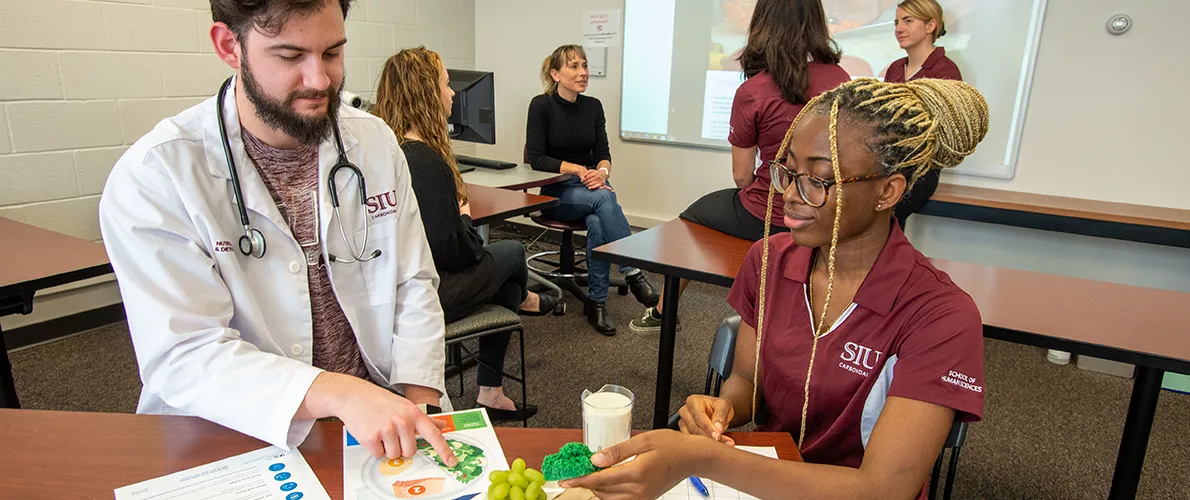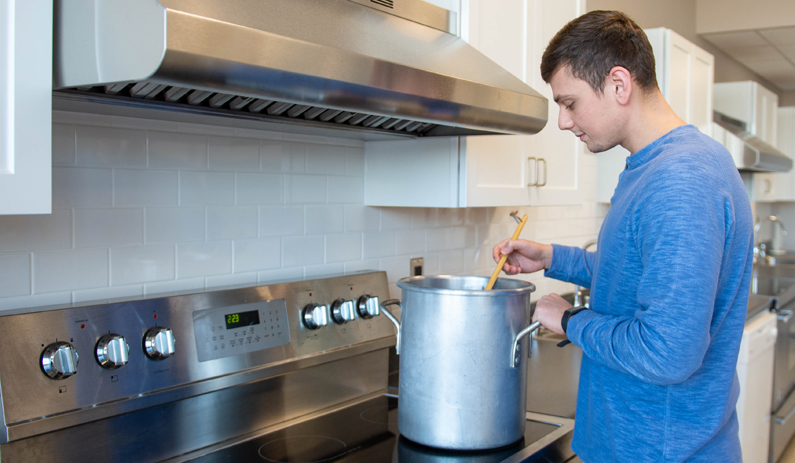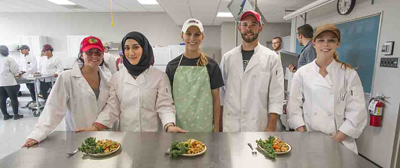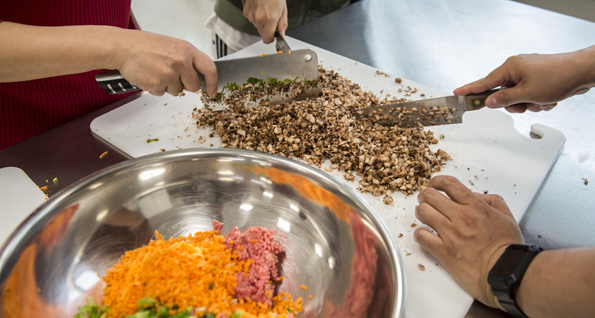Main Content
Bachelor of Science in Human Nutrition and Dietetics

The broad curriculum provides the knowledge and skills necessary to become a successful nutrition professional. Courses cover topics ranging from chemistry and marketing, to nutrition through life cycles, sports nutrition, experimental foods and metabolism. Our graduates will have the skillset to enter the workforce in a variety of fields or can begin advanced studies to become a registered dietitian.
How to become a dietitian
The first step to become a Registered Dietitian Nutritionist (RDN) and/or Licensed Dietitian/Nutritionist (LDN) in the State of Illinois requires successful completion of an accredited DPD program. To become a RDN or LDN the following qualifications apply:
- Complete a bachelor’s degree at a university accredited by the Accreditation Council for Education in Nutrition and Dietetics (ACEND®). Once the registrar’s office confirms the student graduated, a Verification of Completion Form will be issued confirming the knowledge requirements for Registered Dietitian Nutritionists have been met.
- After graduation, 1000 hours of supervised practice (also called dietetic internship – DI) through an ACEND® accredited Dietetic Internship, Coordinated Program in Dietetics or an Individualized Supervised Practice Pathway (ISPP) offered through an ACEND® accredited program.
- Effective January 1, 2024: The Commission on Dietetic Registration (CDR) now requires a minimum of a master’s degree to be eligible to take the credentialing exam to become a registered dietitian nutritionist (RDN).
- Successful completion of a national examination administered by the Commission on Dietetic Registration (CDR).
- To maintain the credential, an RDN must complete continuing professional educational requirements.
(Note: Illinois requires licensure of dietitians. This site provides a listing of all states in the US that require licensure.)
Bachelor of Science
The undergraduate major can be accomplished by fulfilling the requirements for the Bachelor of Science degree.
- Total degree requirements: 120 credit hours
- University core curriculum: 39 credit hours
- Major Requirements: 32 credit hours
- Additional Requirements: 49 credit hours
![]() Check out the Curricular Guide, which helps you outline what courses you would want to take each semester for all four years.
Check out the Curricular Guide, which helps you outline what courses you would want to take each semester for all four years.
View all related undergraduate courses.
View Student Handbook
View Academic Calendar
Diet Technician, Registered (DTR)
Another career option in the field of nutrition is the Diet Technician, Registered (DTR). This position provides direct patient care under the supervision of a Registered Dietitian Nutritionist (RDN). DTR’s conduct patient screens, collect data, and assist the RDNs in providing medical nutrition therapy in various settings, including hospitals; clinics; nursing homes and retirement centers; hospices; and home health-care programs. There are also many job opportunities that allow DTRs to work independently providing general nutrition education. Potential places of employment consist of schools; day-care centers; correctional facilities; restaurants; food companies; health-care facilities; corporations and hospitals; Women, Infants, Children (WIC) programs; public health agencies; and Meals on Wheels as well as other community health programs. The duties conducted by DTRs in these areas include, but are not limited to, management of employees; purchasing and food preparation; maintaining budgets within foodservice operations; implementation of programs and presentation of classes for the public, health clubs, weight management clinics, and community wellness centers; helping educate consumers about the connection between food, fitness and health; developing menus for contract food management companies or food vending and distributing operations; conducting nutrient analysis and data collection; and overseeing foodservice sanitation and food safety.
To become a DTR the following qualifications apply:
- Successful completion of a Dietetic Technician Program accredited by the Accreditation Council for Education in Nutrition and Dietetics (ACEND®) of the Academy that includes 450 hours of supervised practice experience in various community-based programs, health care and foodservice facilities and completion of at least a two year associate's degree at a U.S. regionally accredited college or university
- Completion of a Baccalaureate at a university accredited by the Accreditation Council for Education in Nutrition and Dietetics (ACEND®) or successful completion of coursework in an ACEND®-accredited Didactic Program in Dietetics and completion of at least a bachelor's degree at a U.S. regionally accredited college or university
- Successful completion of a national examination administered by the Commission on Dietetic Registration (CDR)
- To maintain the credential, a DTR must complete continuing professional educational requirements
The Didactic Program in Nutrition and Dietetics (DP) at SIU provides the classroom component of dietetics education to obtain a B.S. degree and/or Verification of Completion Form, thus completing the first step in becoming a Registered Dietitian Nutritionist or a Diet Technician, Registered.
Finish your Bachelor’s, Master’s, and Dietetic Internship in 5 years!
Ready to take your nutrition journey to the next level?
High-achieving students majoring in Human Nutrition and Dietetics (B.S.) have the incredible opportunity to fast track their education through admission to the accelerated Master of Science in Human Sciences! Imagine earning your bachelor's and master's degrees faster—with up to 9 credit hours counting toward both!
Apply for this accelerated program in the spring of your junior year and get a head start on your future!
And there’s more—if you’re aiming to become a Registered Dietitian Nutritionist (RDN), you can apply for early admission to the combined MS/Dietetic Internship in the fall of your senior year. Earn both degrees and complete your dietetic internship—making you eligible to sit for the RDN exam—in just 5 years! This is your chance to dive into advanced training and stand out in the field you love!
Your future starts now—why wait? Contact Dawn Richards at dawnnull@siu.edu for more information!
Effective January 1, 2024, the Commission on Dietetic Registration (CDR) will require a minimum of a master’s degree to be eligible to take the credentialing exam to become a registered dietitian nutritionist (RDN). In addition, CDR requires that individuals complete coursework and supervised practice in program(s) accredited by the Accreditation Council for Education in Nutrition and Dietetics (ACEND). In Illinois, graduates also must obtain licensure to practice. Graduates who successfully complete the ACEND-accredited DPD program at Southern Illinois University are eligible to apply to an ACEND-accredited supervised practice program. For more information about educational pathways to become an RDN please visit this website.
Scholarships
Students have several opportunities for financial awards through both SIU’s Academic Scholarship Office and the Academy of Nutrition and Dietetics Foundation. The Foundation Awards program is available to sophomores, juniors and seniors in the dietetics program.
Scholarships are based on achievements in academics, community service and program development in the study of nutrition and dietetics.

Registered Student Organization
The Student Nutrition Academic Council (SNAC) is the registered student organization for students in the HND program. Created to encourage networking and increased interest in the field of dietetics, SNAC hosts events to foster professional relationships and increase knowledge within the student body and alumni.
Using principles outlined by the Academy of Nutrition and Dietetics, members plan multiple activities throughout the academic year that allow for interaction with local registered dietitians while creating camaraderie and providing unique insight into the many facets of dietetics.
Activities include organizing food drives, volunteering at food banks, creating recipes, developing basic meal plans, working concessions at sporting events, participating in research, assisting with sustainability efforts, and much, much more!

Facilities
Students in the Human Nutrition and Dietetics program receive hands-on instruction and training in skills necessary to succeed as dietitians in several areas of practice. While classroom studies of dietetic theories and concepts is a portion of the HND course of study, laboratory work provides the competence needed for successful careers in dietetics.
Food prep labs allow students to master the practical components of cooking and food preparation while covering topics in safety measures, personal nutrition and culinary skills.
Labs for social sciences provides students the opportunity to interpret the effects of diet and nutrition on individuals, communities and at-risk populations.
Construction of a sensory kitchen laboratory is in the works at SIU for students to master the latest in topics related to this burgeoning study within dietetics.
Contact Information
Kaysie Hotop
Director
213C Quigley Hall
875 S Normal Ave
Carbondale, IL 62901
618-453-2462
kaysie.hotop@siu.edu
Allison Vandenberg,
Academic Advisor
Pulliam Hall Rm 252
475 Clocktower Drive
Carbondale, IL 62901
618-453-8854
allison.vandenberg@siu.ed




